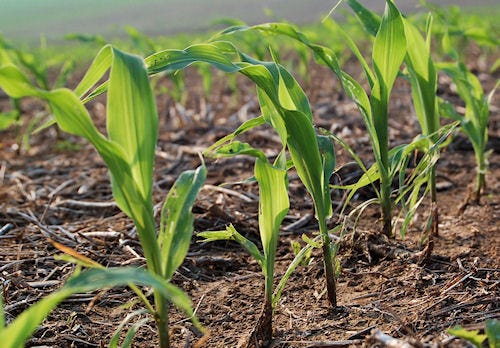
Hard as it is to imagine, many Northeast farmers still haven't gotten their corn in the ground or replanted due to wet weather. This week's crop progress report from U.S. Department of Agriculture showed excessively wet soils were still hampering corn planting in north central Pennsylvania and northern New York.
In Pennsylvania, for instance, only 80% of the corn crop was planted as of last Friday. New York's National Ag Statistics Service office doesn't track crop progress.
What to plant now

WISHFUL THINKING? Some dairy farmers in north central Pennsylvania and northern New York would love to see their fields with this corn.
Time is running out for dairy farmers wanting to plant corn for silage, suggests Jerry Cherney, Cornell University Extension agronomist. Field research conducted on Northern New York farms at Canton, Hazy and Willsboro may offer clues as to best alternatives.
The field trials, funded by the Northern New York Agricultural Development Program, evaluated planting shorter season corn hybrids such as brown midrib corn and BMR sorghum-sudangrass. In the past, such tough conditions have pushed corn planting as late as mid-June to mid-July, notes Cherney. Some dairy farmers may decide not to plant corn that late and purchase supplemental forage, which can be costly.
Data from the Northern New York farm trials indicates that brown midrib sorghum-sudangrass can be a corn silage alternative after June 15. It doesn't appear to have the sensitivity to stress that BMR corn exhibits.
Cherney cautions that the selection and field management of supplemental or emergency forage crops requires a thorough evaluation by each farmer. In some cases, he says, it may be more economical to buy forage compared to producing forage with a relatively high cost of production per ton.
"By mid-July, it's time to forget about planting corn or sorghum-sudangrass and consider other options such as small grains," advises Cherney. "Small grains can fit well into the dairy feed ration. Winter wheat, for example, can be grazed in the early spring and harvested for grain or silage later."
Spring-seeded oats and barley are the best small grain options for forage. The Small Grains for Supplemental Forage fact sheet posted in the Field Crops section of the Northern New York Agricultural Development Program website http://www.nnyagdev.org discusses the different management aspects of planting oats, barley, triticale, and three small grains planting mixes. The Corn vs. SXS for Supplemental Forage fact sheet compares late season corn vs. sorghum sudangrass.
About the Author(s)
You May Also Like




